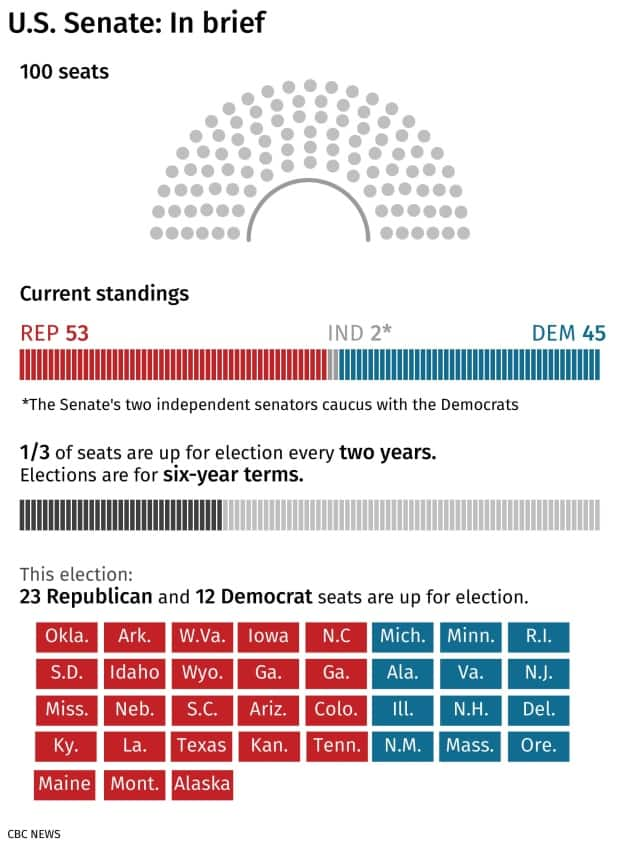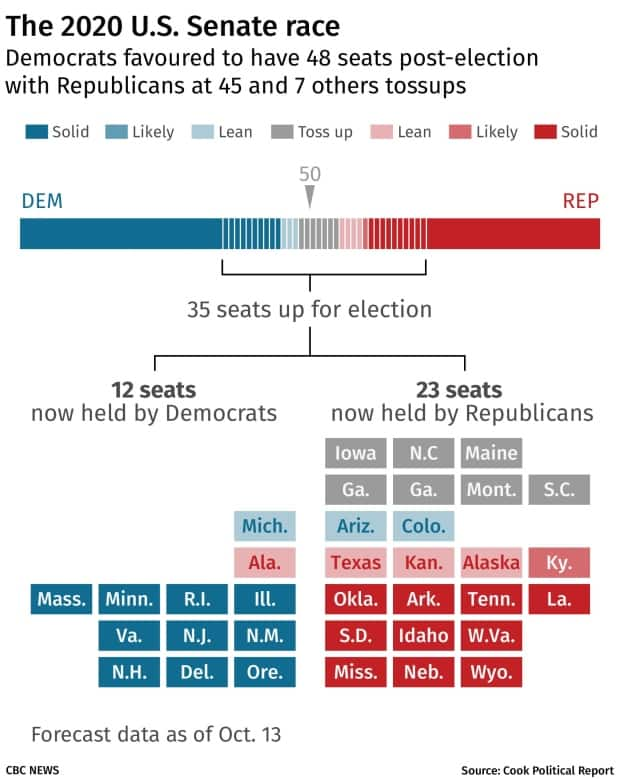A rundown on the race for U.S. Senate: How a few seats could shape history
Winning the presidency is one thing. Being a successful president is an entirely different matter. And Joe Biden's fate could be determined, on both counts, in the coming days.
The Democratic candidate's hope of signing landmark legislation if he's elected president on Nov. 3 may rest on a handful of races that will decide which party wins the U.S. Senate.
Biden's ambitions include a proposed public health-care option, reforms limiting money in politics and a $2 trillion climate and infrastructure plan.
Such policies hinge on Democrats getting bills through Congress, which would be hard to near-impossible in the current Republican-controlled Senate.
Consider that the most important legislative achievements of recent presidents only occurred in the brief window of time when their party held the Washington trifecta: the White House, the House of Representatives and the Senate.
That applies to the Obamacare health reform when Democrats controlled all three from 2009-11 and to tax reform when Republicans were similarly dominant from 2017-19.
"When we've seen big, sweeping changes pushed through, it's been when there has been unified government," said Jessica Taylor, the Senate editor for the election-forecast outfit Cook Political Report.
"Democrats winning the Senate is crucial to a number of things Joe Biden wants to advance."

It's now a tight race — though Democrats have an edge.
The Cook Political Report sees Biden's party likely holding at least 48 Senate seats in next month's election and Republicans likely holding at least 45, with seven other toss-ups in mostly conservative-leaning states.
Passing legislation would be especially important to Biden given the increasingly conservative composition of the courts.
If he tried advancing priorities by other means, namely through executive orders, they would face greater risk of being struck down by unfriendly courts.
There is also pressure on Biden, who served as vice-president under Barack Obama, to deliver in an era of sustained bitterness toward democratic institutions that Americans see as ineffectual.
Democrats are so eager to churn out changes if they take power that they're already embroiled in impassioned debates about whether to undo Senate procedural rules.

The Senate's decades-old filibuster norm requires a 60 per cent majority to advance most legislation, and many Democrats want it gone.
Yet regardless of the outcome of that debate, merely winning a 51-seat majority would open up new avenues of possibility for Biden and the Democrats.
A simple majority would allow them to pass some tax and fiscal measures; confirm judges; decide which bills are allowed for a vote; and give them control of committees — using them to push legislation, instead of investigations into Biden's White House.
Magic number for Democrats: 3, 4 or 5
In the current Senate composition, Republicans hold 53 seats, while Democrats and Democratic-leaning independents hold 47. Thirty-five of 100 seats are up for grabs in this election.
The math for the coming weeks is simple: It involves three magic numbers.
Democrats must gain three Senate seats to win a de-facto majority if they also win the White House, because the vice-president would vote to break a 50-50 tie.
But they probably really need four, if, as expected, Democrats lose an Alabama seat they won under extraordinary circumstances in a 2017 special election.
The worst scenario for Democrats? They'll need five new seats if they suffer an upset loss in Michigan.

Polls have them heavily favoured to gain two (Arizona and Colorado), while they're leading in three others (Maine, Iowa and North Carolina) and competitive in seven other races (Montana, South Carolina, Kansas, Alaska, Texas and two in Georgia).
"All signs that we see point to pretty sizable Democratic gains in the Senate — or at least enough for a majority at this point," Taylor of Cook Political Report said.
"Democrats at this point have multiple paths to the majority."
The race-by-race rundown
Another election-forecast team at the University of Virginia's Center for Politics broke down all of these races in a recent online briefing.
Democrats are, in some ways, starting this election with a one-seat deficit.
That's because they hold the likeliest seat to flip: in Alabama. Democrat Doug Jones won the seat in a miracle upset in 2017, thanks to an underage sex scandal involving an already controversial candidate, Roy Moore.
Jones is running a decent race this time around but would still be doomed even if he ends up performing a dozen points ahead of other Democrats running in Alabama, said Miles Coleman of the Center for Politics.
"That's just how red the state is," he said.
That's where the good news stops for Republicans. They hold the next six seats identified as likeliest to flip by the Center for Politics.

In Colorado, a major Democratic donor group has reportedly stopped spending money on the race and shifted resources elsewhere, so confident that the seat is destined to flip to Democrats.
Former Colorado governor John Hickenlooper should easily defeat first-term Sen. Cory Gardner, said the director of Center for Politics, Larry Sabato.
He said Gardner was elected in a particularly good year for Republicans in 2014, but this is not a particularly good year for Republicans, and the state is already trending blue.
"Donald Trump is not their cup of tea [in Colorado].... Trump is going to lose Colorado rather badly. And that pretty much condemns Cory Gardner to being a one-term Republican," Sabato said.
Easy races, tough races
In Arizona, Democrat Mark Kelly has held strong, sustained leads in the polls for months over Republican Sen. Martha McSally.
He's an astronaut and husband of former lawmaker Gabrielle Giffords, who survived an assassination attempt in 2011 and became a gun-control activist.
In Maine, Trump has all but written off longtime incumbent Susan Collins. She appeared unbeatable until recently, winning her last race, in 2014, by 37 points.
She's now trailing in the polls to the speaker of Maine's legislature, Sara Gideon. Coleman said Collins is being pulled apart by the polarized politics of our time.
Collins frequently enrages Democrats and moderates by voting with Trump. Yet she also infuriates Trump allies; a research project by the news website Axios found that Collins is actually the No. 1 most likely of all congressional Republicans to condemn Trump in a controversy.
"She's really tried to walk the line of being a moderate in the Trump era. And that's just very hard," Coleman said.
The tipping point struck by scandal
Democrats were displeased, to put it mildly, when their North Carolina candidate, Cal Cunningham, was caught this month in a sexting scandal with a woman who isn't his wife.
"You epic f***ing idiot," tweeted Patrick Dillon — whose wife, Jen O'Malley Dillon, is Biden's campaign manager.

Such anger is understandable. Biden's ability to ever pass landmark bills could hinge on the result in North Carolina.
That state and Iowa are deemed the likeliest contenders to deliver Democrats their so-called tipping point win — the majority-claiming 50th seat.
Democrats were displeased that all of their country-shaping legislative hopes might have been undermined by an adulterous affair.
"I mean, you never want a sex scandal to pop up in October. And certainly not in one of the most important states," Taylor said.
What do you want to know about the U.S. election? Email us at Ask@cbc.ca
Yet the worst fears of Democrats, it appears, are not materializing so far. Cunningham, a state senator, is still leading most polls in a close race against Sen. Thom Tillis.
Sabato said he believes this incident proves we are now in a post-scandal era, as Democrats and Republicans — having both excused Bill Clinton and Donald Trump — can't get too worked up over adultery lest they reveal themselves as hypocrites.
It's unclear if the scandal cost Cunningham a point or two, he said, creating a tougher fight in a race that appeared to have been won.
Another potential tipping-point state is Iowa.
Theresa Greenfield, president of a real estate company, is looking to knock off first-term Republican Sen. Joni Ernst.
Most but not all surveys show Greenfield ahead. Ernst is trying to use Greenfield's real estate practices against her, blaming her for displacing tenants.
Yet Greenfield leads most surveys. She also upstaged Ernst in a debate in the farming state by sounding more knowledgeable about the cost of commodities.
"The polls are not good for Joni Ernst," Taylor said, adding that Greenfield's campaign is flush with cash and flooding the airwaves with ads.
The suspense over the Senate could last until January.
That's because there are two races in Georgia that would head to a run-off election in early 2021 if nobody wins an outright majority. Both races are close.
Democrats are also more competitive than usual in conservative-leaning states such as Montana, where Democratic Gov. Steve Bullock is on the ticket, as well as in Alaska, Kansas and South Carolina.
In South Carolina, the Democratic challenger to Sen. Lindsey Graham, Jaime Harrison, has raised a historic $57 million in a single quarter, smashing fundraising records for a legislative candidate.

Graham, a former Trump critic turned staunch defender, has been making appearances on Fox News to plead for donations.
That illustrates just how badly Democrats want to unseat Graham. No other Republican running this year provokes such deep enmity from Democrats — aside from Trump, of course, Sabato said.
"What an upset that would be," Sabato said of a win by Harrison, who is African-American. "South Carolina would have two African-American senators [along with Tim Scott] — one Republican, one Democratic. Who'd have thunk it?"
That said, Graham remains favoured in the polls and in forecasters' projections.
Hopes for a Republican upset
Another African-American newcomer is hoping to land an upset. And if it occurs, it would deal a blow to Democrats' hopes of winning the Senate.
Veteran, businessman and Republican John James is hoping to upset a low-key first-term Democratic senator, Gary Peters of Michigan.
Some surveys show the Republican is close or even ahead. Yet the overall polling and the national dynamics favour the Democrat, Sabato said.

"Peters has something James could only dream of," he said: Biden, his party's presidential nominee, is heavily favoured in Michigan.
He said Biden voters picking Democrats down the ticket may be enough to pull Peters across the finish line.
"But by no means is that a sure thing," Sabato said.
And an upset in Michigan would complicate the math for Democrats' hopes of achieving that coveted Washington trifecta.


